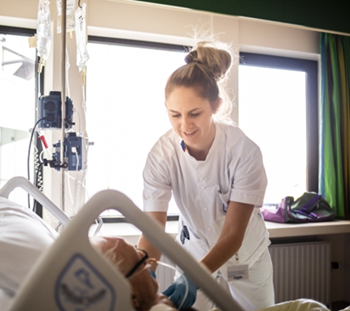Medical German: an aha-erlebnis for healthcare providers
Brauchen Sie Medikamente?’ is a simple question a Dutch doctor might ask a German patient to find out about their medicine use. Except that the German patient will probably look surprised and think ‘why should I decide whether I need medicine?’
Text: Karin van Ommeren / Photos: UMCG

What is the problem here? Unbeknownst to healthcare provider and patient, differences between the Dutch and the German languages are playing tricks on them. In German, brauchen does not mean ‘to use’ as in Dutch, but ‘to need’. Languages that resemble each other too closely can sometimes be treacherous, which can lead to people making mistakes they are not aware of.
Especially in the medical world, miscommunication is something you want to prevent. Therefore, the University of Groningen Language Centre has for some time focused on offering language and culture training programmes for healthcare staff. In the past year, the Language Centre developed a valuable partnership with the Wenckebach Institute, the UMCG training institute, in organizing a successful pilot for a training programme in Medical German. Janke Hummel, senior consultant at Wenckebach, explains that the training programme is a bit of an oddity among healthcare-related offerings, which incidentally did not stop it from becoming a great success. ‘It is an answer to a problem that goes beyond healthcare and that people do not immediately think of.’
Medical German pilot
In the autumn of 2021, the pilot started with two training programmes in Medical German: one for UMCG doctors and one for nurses. Since the UMCG is the first academic hospital in the direct vicinity for Germans living across the border, the healthcare staff is often faced with German patients.
Mariëtte Nieuwenhuis, lecturer in German at the Language Centre, is responsible for teaching the training programme: ‘The purpose of this programme is to help the participants become more confident, so they dare to speak up. I provide them with the required tools, such as role plays, which I think are the most important aspect of every course. Our focus lies on vocabulary and conversation techniques, not grammar.’ Participant Hanne-Rinck Jeltema, neurosurgeon at the UMCG, confirms this: ‘Right from the start, we spoke a lot of German, and there was plenty of room for asking about specific professional terminology.’
The role of culture

In addition to focusing on language, a part of the course is devoted to gaining insight into German medical culture. Anita Egberts, course organizer at the Wenckebach Institute, reports that the cultural aspects included in the course were a real eye-opener for many participants.
For example, hierarchy plays a much greater role in Germany than in the Netherlands, whether between doctor and patient, or among doctors. Also, the attitude towards medical imaging is very different. These and other aspects of German culture can lead to a German patient in a Dutch hospital not feeling understood or heard. ‘The programme promotes mutual understanding between healthcare providers and patients and improves the quality of the treatment,’ Anita Egberts says.
Strengthen collaboration with German hospitals
The programme improves the relationship not only between healthcare providers and patients, but also between Dutch and German healthcare providers and hospitals. In particular, during the COVID-19 pandemic, the focus really shifted towards collaboration between the UMCG and German hospitals, which has given this programme immediate added value. Other partnerships in the region also let the Wenchebach Institute know how much they appreciate the Institute offering this programme.
Increase the target group
The Wenkebach Institute is planning to make the training programme available for healthcare providers from outside the UMCG, since it since it meets a need that is relevant to every healthcare provider. Participants from previous rounds are unanimously enthusiastic about the programme:
‘Medical German for physicians is a practical and intensive course, useful for physicians of all kinds’
Hanne-Rinck Jeltema, neurosurgeon at the UMCG
‘A short and powerful course where we got to speak a lot “zu zweit”, with “Viel Erfolg, viel Spaß”’
Bart Rottier, paediatrician-pulmonologist at the UMCG
Interested in a language and culture training programme focused specifically on your profession? Feel free to contact the Language Centre. We will gladly help you explore the possibilities!
More news
-
15 September 2025
Successful visit to the UG by Rector of Institut Teknologi Bandung

